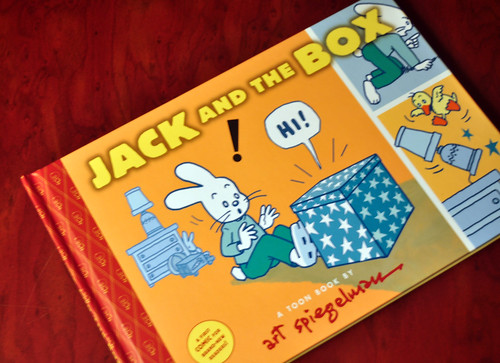On a large screen behind legendary comic artist Art Spiegelman is an image of a page from the dictionary. A fat red loop lassoes the definition of “comic strip.” “comic strip. A narrative series of cartoons.” The comic strip, Spiegelman explains is an inherently narrative form and their story-telling capability puts them at the heart of our culture. “And any definition of comic strip that is illustrated by Nancy is getting something right,” he joked of the marginal picture.
This was “Comix 101,” or, as Spiegelman retitled the Corcoran’s Argentina Copello Dudley Lecture, “What the %@~*!! happened to Comics?” It was a walk through the halls of the museum of comics and culture, the walls lined with panels of characters both familiar today and obscure: Little Nemo, Donald Duck, Little LuLu, Charlie Brown, and – of course – those poster boys of the comic book – Batman and Superman. Spiegelman, winner of a Pulitzer-prize for his Holocaust narrative Maus, traced the graphic evolution and influence of comics as well as underlined the politics of the genre.

‘cartoonist art spiegelman’
courtesy of ‘mr. diazzler’
“Comics are the battlefield that great issues are battled on,” Spiegelman said. Comics had their adolescence as a “trashy” mass media that captivated young people, much to the consternation of adults. In the middle of the 20th century, adults and representatives went to war on “filthy” comics, much as they do today with violent video games and “sexting.” A series of Senate hearings in 1954, backed by the ideologies of Bellvue psychiatrist Frederic Wetham, promoted comics as the “Seduction of the Innocent” and led to the creation of the Comics Code Authority, a content regulator and upholder of family values (read: censor).
The CCA code rendered comics innocuous by censoring any instances of the following: kidnapping, concealed weapons, excessive violence, “sex perversion,” seduction, vampires, ghouls and zombies. No horror, no violence, definitely no sex. In other words, no fun. Imagine what the CCA and Congress of those days would think of the teen sensation Twilight!
Approaching the turn of the century, these rules seemed to ease and abiding by the CCA code became less of a standard of conduct. Speigelman illustrated the relaxing of these restrictions by displaying his search results for “Manga, Mother and Daughter.” The cover illustration for “Anyone You Can Do I Can Do Better,” depicting two comic women (presumably a mother/daughter) nearly exposing their perfectly rotund Manga breasts filled the screen.
Don’t confuse a relaxation of censorship in the comic media, however, with the end of controversy. Despite the fact that comics are “only lines on paper, folks!” in Spiegelman’s words, uproar over “inappropriate content” continues. Just think about the the hullaballoo over the Danish cartoons, or the Obama-monkey-unintentional-intentional-parallel cartoon, or the Obamas Terrorist New Yorker cover. Spiegelman himself has weathered a deal of fervor, especially resulting from his 1993 New Yorker cover portraying a Hassidic Jew kissing an black woman – a depiction of the cool-down of racial tensions in Crown Heights, Brooklyn. The controversies surrounding “incendiary” comics demonstrate the relevancy and potency of the comic image in our culture today, as well as raise questions of the ability to interpret satire – a quality at the heart of comedy in general.

‘Jack and the Box’
courtesy of ‘CellPhoneSusie’
It is a new moment for comic books, Spiegelman noted. The number and popularity of graphic novels has been on the rise, with comics surviving as a “recession-proof” publishing model. Graphic narratives are no longer a limited genre, but rather have expanded to embrace tragedy, autobiography, drama, historiography. This was something Spiegelman could be credited with causing, in a way, with Maus, though he admitted he had no intention of genre-busting when the concept began to percolate in his mind. Rather, he had an irrepressible desire to understand and narrate his parents’ story and reached for a medium that served him, as it has served many throughout our cultural history, and to great effect.

Was he allowed to smoke?